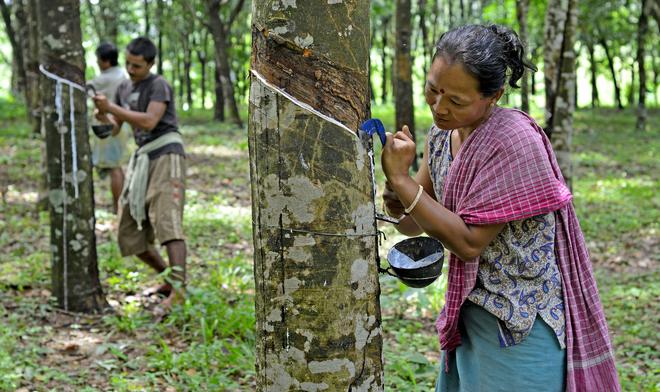Gone are the days when rubber growers from far away destinations descended on the Central Travancore townships in search of quality planting materials. Stung by a sharp drop in the demand for rubber saplings locally, the famed rubber nurseries of Kerala have started moving to the North East. Having played catch up with their counterparts for years now, the rubber nurseries here have begun establishing units all across the plantation belt from West Bengal to Meghalaya. The move takes a cue from the Inroad project by the Rubber Board, which seeks to develop rubber plantations in two lakh hectares across the seven North Eastern States in a span of five years from 2021- 22. According to Jose Kutty Antony, secretary of the All Kerala Rubber Nursery Owners Association, nearly 15 nurseries from the State have already opened their branches in the region while a handful of others are slated to follow them ahead of the next planting season. He attributed the shift primarily to the sharp drop in the ratio of re-planting in Kerala. “Delivering the saplings as contracted by the Rubber Board in sites across the North East has been a logistical challenge, taking the price per sapling to ₹116. Last year, when the Board was responsible for delivering the consignment, this was around just ₹90 per sapling. By establishing nursery units there, we will be able to bring down the cost further by some 30%’’, explained Mr.Antony.

In the recently concluded planting season across the North East, the nurseries in Kerala especially across the Mannarkad – Palakkad belt, supplied just over 30 lakh saplings. The saplings, procured by the Rubber Board, were transported directly to the plantations in over 150 A/C container – trucks. The saplings for planting in the previous couple of seasons had been taken to Guwahati in Assam on board various passenger and special trains from the State.
“Planting has been completed in over 41,000 hectares in the third phase, taking the total area under the crop to around 60,000 hectares of land,” said a Rubber Board official. Taking the high-damage ratio of plants being delivered from Kerala, the board has now decided to source the saplings only from the local nurseries in the North East.
“Besides bringing down the cost, it will also remove the hassles involved in delivering the saplings in the interior parts of the region,” the official added. The rubber growers in Kerala, meanwhile, have raised concerns over the availability of quality saplings in the local market.
“The bulk movement of rubber saplings will only help the eagerness among local growers to deviate to fruits and other alternatives,” said Aby Ipe, a rubber grower from Pampady and District General Secretary of the Karshaka Congress in Kottayam.







